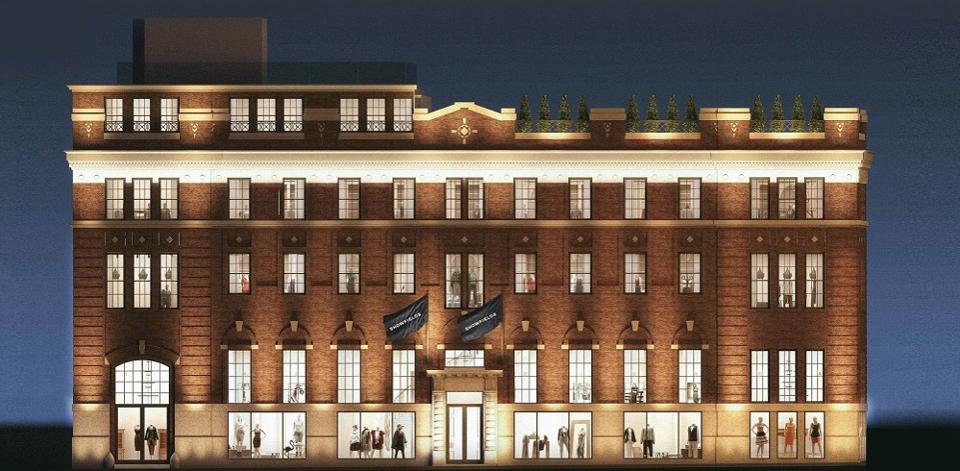4 Takeaways from a Talk with Showfields Co-Founder Katie Hunt
By Inspira Marketing
January 14, 2020
By Inspira Marketing
January 14, 2020
Last week, a number of Inspira team members made the trek into New York City to check out Showfields, the self-dubbed “most interesting store in the world.” While Showfields Co-Founder and CRO, Katie Hunt, made sure to point out that the tagline is partially tongue-in-cheek, there is a different quality to Showfields that separates it from your run-of-the-mill retail store. Located at 11 Bond Street in NoHo, Showfields is a retail concept that is designed to engage consumers’ sense of discovery through a revolving array of in-store brand experiences. Put simply, Showfields is a hub of experiential retail.
Beyond touring through the Showfields space and learning about each of the direct-to-consumer brands that call 11 Bond Street home, we got a chance to sit down with Katie Hunt and hear her thoughts on a variety of topics ranging from diversity in the workplace to the future of technology and measurement when it comes to the world of marketing.

On Diversity of Opinion
Hunt ultimately became a Co-Founder at Showfields through her work with The Fund, a community-based venture capital group that invests in and mentors early-stage companies in NYC. Upon hearing the pitch for Showfields, she decided that it was a project she had to get involved with in a more hands-on manner. However, working alongside two other founders – both of whom happen to be from Israel – requires an openness to ideas that aren’t your own.
“No good things come out of people who all have the same opinion sitting in a room,” said Hunt. “I have a very strong opinion on 99.9% of things that I’m willing to change in 99 seconds. I need people who want to push back against me and argue with me and come to resolution. And by coming to a resolution, coming to a place that’s potentially stronger than anywhere I could’ve gotten on my own.”
On Instagram and the Social Moment
While Showfields is an undeniably Instagrammable venue in its own right, Katie was quick to differentiate aesthetically pleasing design from designing solely for the sake of Instagram. “I think building anything Instagram-worthy for the sake of Instagram is never going to get the consumer who is going to purchase what you are selling,” she said. “You want to focus on telling your story, and by focusing on telling someone’s story and creating really magical moments around that, it’s way cooler than standing in front of a flower wall.”
Of course, many marketers still want the social moment on behalf of their brand, but Hunt thinks that Showfields has been able to start proving that it’s brand-demeaning versus brand-enhancing. “We’re finding that, in our spaces, people are more likely to take pictures of product and post them rather than pictures of themselves, which is ultimately more brand-elevating.”
On the Future of Measurement
Whether you work in experiential marketing or any other industry, the demand to measure the efficacy of your efforts has reached a fever pitch. While Showfields uses sensors to heat map the store and better understand foot traffic, she still thinks that measurement is going to be a topic of heated debate in the coming years.
“It’s hard,” she said. “I think attribution is something that will be solved within the next 10-20 years, but it won’t be solved in a way that people will like. It will be a lot of data collection that some people will not be comfortable with, and I think we need to be very cautious about always respecting the consumer and always respecting their rights and their boundaries. We get pitched on technology all the time and it’s like, ‘that would be awesome, but it’s so creepy!’”
On the Role of Technology in Consumer Experience
While experiential activations continue to become more tech-forward, Hunt warned that technology need not be incorporated solely for the sake of it. “I think technology can only serve the purpose of elevating the [consumer experience]. If it is ever deteriorating the [experience], we’re not going to do it. In this instance, deterioration means that you’re breaking the human interaction that is happening. People want a human experience, and I don’t think we’ll ever get to a place where – outside of a quick-purchase situation like at an Amazon Go store – people won’t want that human interaction.”
Is your brand looking to create authentic, human connections with consumers? Contact us today to learn how our suite of experiential-led services can help you build brand awareness, encourage trial, and earn lifelong loyalists.
{{cta(‘61004bdb-f2f4-4c7f-b7ea-e57bed292904’)}}